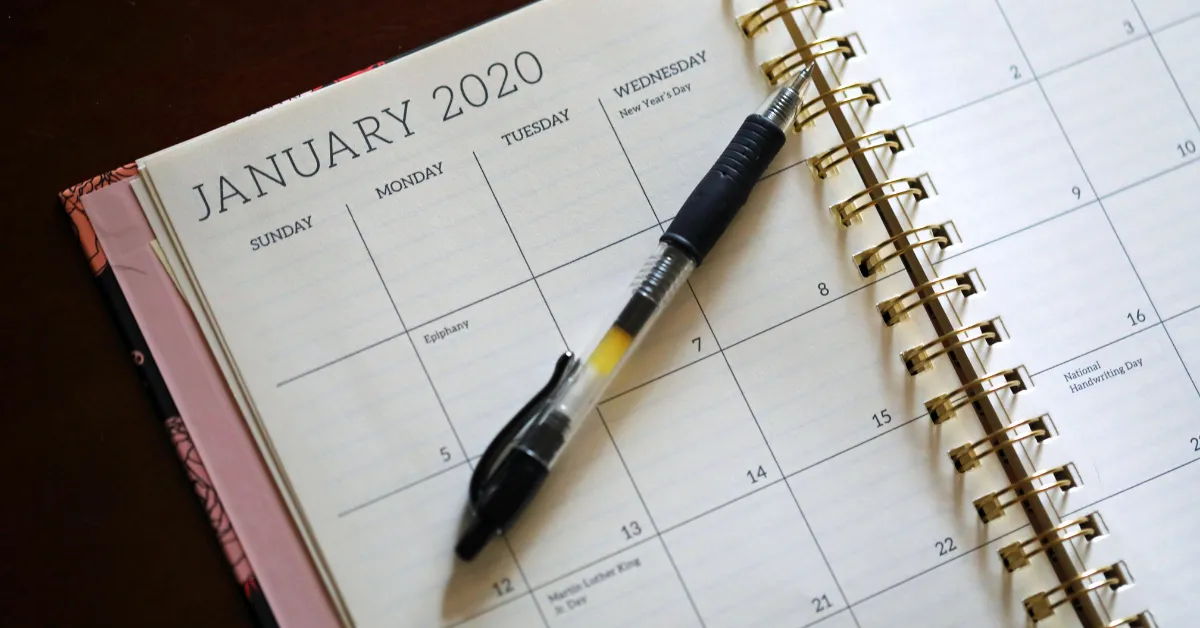Trying to figure out how to plan a productive week, but hitting a brick wall? You’re in the right place.
There’s a saying…”fail to prepare, prepare to fail” which rings true when it comes to productivity. A jobs list without a plan will sit there unfinished, BUT, plan your week right and you’ll be ticking off tasks quicker than you can write them down.

Creating a plan for your week may sound rigid and well, not much fun, but actually, the opposite is true. Once you’ve figured out what to do for a productive week, you will feel able to relax, and use your downtime for fun instead of feeling guilty about what you should be doing.
Here are 8 steps to follow in order to plan a productive and achievable week, without losing your mind, even if you have 101 things to do.
Plan In Advance
If you’re wondering how to plan a productive week, it starts before the week has even begun.
Trying to plan your week as you go is very difficult. It’s easy to get muddled, things get left off the list, and it’s harder to feel organized and on top of things.
Instead, sit down on a Sunday evening and use your journal to plan your entire week. You can bulk plan several weeks, but we wouldn’t recommend doing this. This is because events and priorities can change, meaning you’ll need to revisit your plan anyway, which is not a very efficient use of your time.
Jot It All Down
If your brain is feeling frazzled with thoughts flying all over the place about this job or that job, a good way of clarifying what needs to be done is by brain dumping.
Take a separate piece of paper or an empty page in your journal, and write down every small task that needs to be done, as well as meetings, engagements with friends, birthdays coming up in the next week, etc.
Seeing it all on paper will help you organize your tasks and enable you to plan out your week efficiently.
Identify Your Priorities
It’s important to identify your priorities when planning. These will be your non-negotiable tasks. Maybe that’s a work deadline that absolutely cannot be pushed, maybe it’s a doctor’s appointment, or maybe you need to get your passport sorted for your next trip.
Whatever it is, your priorities will be personal to you, which is why it’s important to prioritize the most important tasks, rather than just the biggest.
There will be some weeks when you have a never-ending list of tasks to be done, and you’ll realize that there simply aren’t enough hours in the day to achieve it all. On those weeks especially, having a list of priorities enables you to make sure the important stuff gets done, even if other things get pushed back.
Make A List Of ‘Nice To Haves’
Or should we say ‘nice to do’s’. These are the tasks that realistically, don’t need to be done right this very second. Or even this week. These are the tasks that may have been on your mind for a while, but your priorities have taken over.
This could include sorting your closet, a non-essential work task, or giving the house a deep spring clean. Write these tasks down in a way that makes them easily identifiable, such as in a different colored pen.
Time Block
Time blocking can be a helpful tool when figuring out how to plan your week to be productive. Time blocking works by creating sections of the day dedicated to a task or group of similar tasks.
For example, if you work for yourself, you may choose to block out Monday mornings from 9-12 to work on all of your social media content for the week, instead of doing a little each day.
Time blocking makes you more productive because it increases your focus and allows your brain to work on one thing at a time, instead of constantly thinking about your to-do list.
Switching tasks all the time can actually minimize productivity so if you can group similar tasks together throughout the week, it will pay off.
Here are some more benefits of time blocking:
- It provides structure to your day
- It allows you to reflect on how well your time is being spent
- It increases motivation
- It enables you to be more confident in saying no.
- It shows your daily accomplishments
Ask For Help
Asking for help is often frowned upon, and most of us don’t do it nearly enough. While it may be an ego boost to have achieved 44 work tasks, planned a vacation, taken the dog to the vets, batch cooked meals for the next month and dug over the garden, you’ll be hopping on the burnout express in no time if you try and achieve an unrealistic amount of tasks.
A lot of us worry that in asking for help, we will become a burden to our loved ones, but that is often not the case at all. Those close to you will want to help you carry the load (or at least be willing to lighten it), especially if the alternative is you becoming increasingly anxious and unable to relax.
This works in the workplace too. If your boss has given you unmanageable goals, it’s time to have a conversation about how you can both set more realistic timeframes. This may be a nerve-wracking conversation to have, but you’ll come out of it feeling more focused and motivated, and less stressed.
If mundane tasks are taking time away from the jobs you’re the most passionate and interested in, consider ways to create more time, for example, hiring a cleaner, or having your groceries delivered.
Automate What You Can
Has anyone in history ever said, “yes please, I’d love to do MORE work than I have to”? I don’t think so. So, make things easy by automating what you can. This will mean different things for different people but the internet is so advanced now that a lot of tasks can be set up once and then left alone.
Some examples of everyday tasks you can automate include paying your bills, using AI technology to write blog posts for your website, and creating a template for your email responses.
It may take a little while to set up your automations, but you’ll feel the benefits for years to come, and save yourself so much time in the long run.
Reflect On Your Week
On a Friday evening, sit down with your planner or journal and review the week overall. As well as looking at what you have achieved, also review whether there’s an easier way to get things done going forward, whether your to-do list was too long, or if you had blocks of time that could be used more effectively.
You shouldn’t overlook your emotions either. Be sure to consider how you felt during the week – did you feel motivated and focused? Were you happily ticking things off your to-do list left, right, and center? Or were you stressed out, continuously running around trying to keep up with your plan, and wondering how you would get everything achieved?
If it’s the former, fantastic. That means you planned your week in a realistic AND productive way, and when it comes time to plan for the following week, you can use the same system to lay out your tasks.
But, if you did feel stressed, you probably took on too much. Have a second look at the plan you made for the week that’s just passed with fresh eyes and see if there are any tasks you could have automated, any unnecessary tasks, or anything that could have been handed off to someone else.
Use that information when planning for the next week in order to keep your sanity and have a productive week that feels good, instead of just looking good from the outside.
Final Thoughts On Planning A Productive Week
Now you’ve read about how to plan a productive week, it’s time to take all of these tips and put them into action.
Knowing what to do for a productive week and planning effectively means no more scrambling around at 4.55 on a Friday afternoon, after forgetting an important deadline.
Instead, your laptop will be closed, your to-do list will be ticked off, and you’ll be ready to enter the weekend stress-free, all with time to spare.
If you’re looking to make your life easier, check out these posts:


